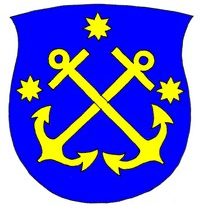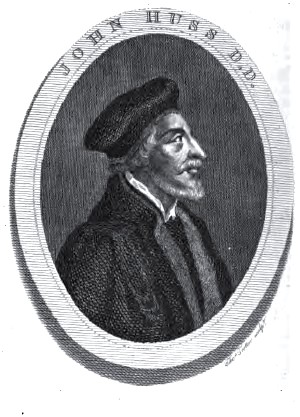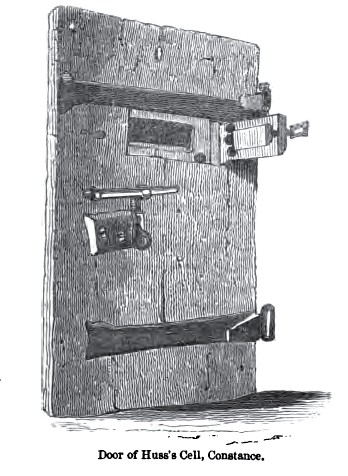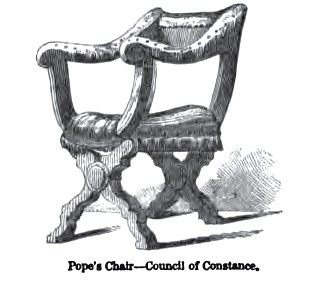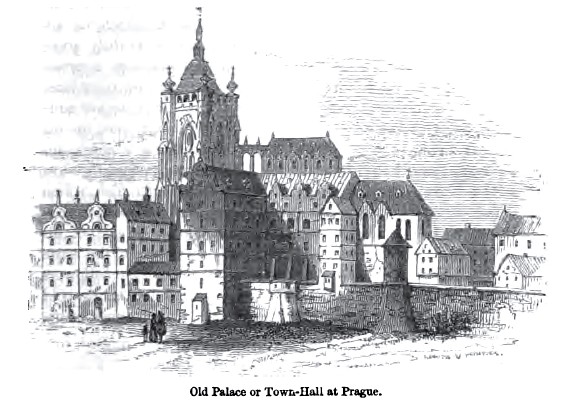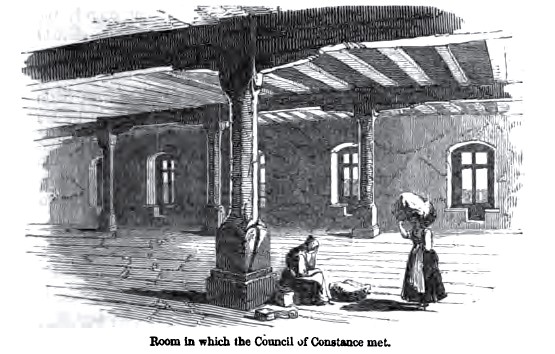Huss, Hussites and Bohemian Brothers.
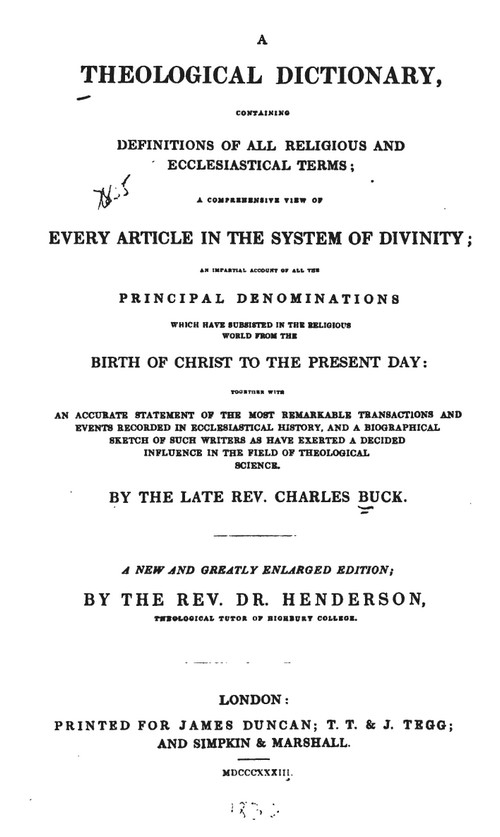
HUSS, JOHN, the celebrated Bohemian reformer, was born near Prague, in Bohemia, about the year 1376, at a village called Hussinez, upon the borders of the Black Forest His parents were not affluent, but his father paid great attention to his education, which he improved by his strong mental capacities, and by close application to his studies in the University of Prague, where he obtained the degree of Bachelor of Arts in 1393, Master of Arts in 1395, and Bachelor in Divinity in 1408. During the course of his university honours, ha obtained also a benefice. John Mulheym, a person of large fortune in Prague, erected a chapel, which he called Bethlehem; and, having amply endowed it, appointed Huss as minister. Huss was at this time a Catholic. The opinions of Wickliffe, though then extending, had not reached Bohemia. Having, about the year 1382, perused, through the medium of a young Bohemian noble man, the writings of Wickliffe, his mind was greatly impressed by them; and he would call him an angel sent from heaven to enlighten mankind. He would mention, among his friends, his meeting with the Works of that reformer, as the most fortunate circumstance of his life. From this time, both in the schools and in the pulpit, he would inveigh with great warmth against ecclesiastical abuses; point out the bad government of the church, and the bad lives of the clergy; and lament the state of the people who were under the government of the one, and the influence of the other. The state of religion in Bohemia was, indeed, at that time very low; it was the subject of barter, and the clergy were most corrupt; Huss, therefore, attracted not only notice, but attention. The followers of Huss became numerous; many members of the university followed him. The works of Wickliffe were translated into the Sclavonian tongue, and read with great attention in every part of Bohemia; and as soon as Pope Alexander V was seated in the chair, observing the diffusion of Protestant principles and writings, he issued a bull, directed to the archbishop of Prague, ordering him to collect the writings of Wickliffe, and to apprehend and imprison his followers. By virtue of that bull, the archbishop condemned the writings of Wickliffe, proceeded against four doctors who had net delivered up their copies of his writings, and prohibited them from again preaching, Huss, with some other members of that university, protested against those measures; and on the 25th of June, 1410, entered a new appeal from the sentences of the archbishop. This affair was carried before Pope John XXIII., in consequence of the previous death of Alexander; and John granted a commission to cite Huss personally to appear at Rome, to answer the accusations made against him. Huss requested to be excused from attending personally. Three proctors subsequently appeared for him before Cardinal Colonna, who was elected pope in 1417. The proctors apologized for the absence of Huss, but expressed their willingness to answer in his behalf; but Cardinal Colonna declared Huss contumacious, and excommunicated him accordingly. The proctors then appealed to the pope: he appointed certain cardinal to draw up a process of the whole matter, and they not only confirmed the sentence of Colonna, but, carrying it further, excommunicated not only Huss, but all his friends and disciples. This treatment had no tendency to lessen the popularity of Huss. His sufferings increased his influence; and multitudes of all ranks, either impelled by gratitude or by compassion, hastened to enlist themselves in his cause. Thus supported, he did not despond; and, although he was prohibited from preaching, he continued to discharge every other branch of the pastoral office; and, among other plans adopted by him, he gave out questions, which he encouraged the people to discuss in private, and to come to him with their difficulties. Thus disappointed and chagrined in his attempts to suppress me reformed, the new archbishop convened a Council of doctors, who drew up and published some articles against Huss and his adherents. But to them he wrote a spirited and judicious reply. Soon after this performance, Huss published another piece against the usurpations of the court of Rome; and to this the archbishop and Council replied. But with writing alone they were dissatisfied, and therefore applied to the pope for assistance, who merely recommended the subject to the king of Bohemia. The letters which Huss wrote at this time are very numerous. He justified Wickliffe’s book on the Trinity, and defended the character of that reformer against a charge brought by a man of the name of Stokes, and others, who accused him of disobedience. He also wrote many discourses against the peculiar doctrines of the Catholic Church.
About this time Peter of Dresden was obliged to fly from Saxony, and seek a refuge at Prague, where he encouraged a priest of St. Michael’s chapel to preach up the establishment of the communion under the species of wine. Huss embraced these sentiments, and for which he was exposed to persecution; but eventually the Hussites were permitted to continue their sermons, and their sentiments became general. In 1412, Huss left his retirement, and returned to Prague. Pope John XXIII at this time published his bulla against the king of Naples, ordering a Crusade against him, and granting indulgences to all who engaged in that war. Huss declaimed against such bulls, Crusades, and indulgences. The populace espoused the opinions of Huss: the magistrates imprisoned and persecuted them, and a massacre ensued; but through the whole affair he displayed a true Christian spirit. Immediately after that melancholy affair, Huss retired to his native place, where he lived protected by the principal persons of the country. Thither some of the most eminent men of every country resorted, to obtain his directions, his assistance, and his advice. During his retreat at Hussinez, he spent much of his time in writing. There he wrote his treatise “Upon the Church” his paper entitled “The Six Errors,” levelled against indulgences, simony, excommunication, &c. These treatises were much opposed, and Huss defended them. Huss, soon after, once more returned to Prague, and engaged in other controversies. At Constance, at this time, the famous Council was held, at which it was determined, that a reformation was necessary; and Pope John was deposed and imprisoned. But against Huss and his followers, it also directed its thunderbolts. Wickliffe was now dead ; but they reviled his memory—burnt his books—and even ordered his bones to be dug up and consumed to ashes. To Constance Huss travelled, there determined to defend his principles, and support the cause of truth. On his journey he was received with acclamations, and in three weeks arrived at that place. He was nominally examined before the pope and the cardinals; and, after remaining there some time, he was one day suddenly seized by a party of guards, in the gallery of the council, although the pope had assured him of liberty and protection. At such perfidy the assembly was surprised; and the pope, confounded and alarmed, could only say that it was the act of the cardinals.
In a lonely monastery on the banks of the Rhine, belonging to the Franciscans, who, as an order, were bitterly opposed to him, Huss was now confined. Yet even there he composed some interesting tracts, among which was one entitled, “A Comment upon the Commandments” another, ” Upon the Lord’s Prayer” a third, “On the Knowledge and Love of God” and a fourth, “On the Three great Enemies of Mankind”. For a long time Huss remained in prison. Catholics of more liberal principles interceded for his acquittal, but in vain. Many sessions elapsed prior to the exhibition of articles against him; but on the 5th and 6th of June, 1515, after a previous examination, he was tried for maintaining the doctrines afterwards professed in the Reformed Church, and was advised to abjure his books and recant. But he magnanimously refused: and on the 7th of July, the Council censured him for being obstinate and incorrigible, and ordered “that he should he degraded from the priesthood, his books publicly burnt, and himself delivered to the secular power”. That sentence he heard without emotion. He immediately supplicated the pardon of his enemies; and the bishops appointed by the Council stripped him of his priestly garments, and put a mitre of paper on his head, on which devils were painted, with this inscription,—” A Ringleader of Heretics”. The bishops delivered him to the emperor, and he delivered him to the Duke of Bavaria. His books were burnt at the gate of the church, and he was led to the suburbs to be burnt alive. Prior to his execution, he made a solemn public appeal to God, from the judgment of the pope and Council, which was fervent and energetic. He was then surrounded with fagots, his mind all the while composed and happy. The flames were then applied to the fagots; when the martyr sang a hymn, with so loud and cheerful a voice, that he was distinctly heard through all the noise of the combustibles and of the multitude. At last he uttered, “Jesus Christ, thou Son of the living God, have mercy upon me!” and he was consumed; after which, his ashes were carefully collected and cast into the Rhino. Hubs was a true ecclesiastic end a real Christian. Gentle and condescending to the opinions of others, this amiable pattern of virtue was strict only in his principles. His great contest was with vice. His piety was calm, rational, and manly; his fortitude was undaunted. “From his infancy,” said the University of Prague, “he was of such excellent morals, that during his stay here, we may venture to challenge any one to produce a single fault against him.” His writings were simple, pious, affectionate, and intelligent Luther said he was the most rational expounder of Scripture he ever met with.
HUSSITES, the followers of John Huss.
TABORITES, the followers of John Huss, so called from the fortified city of Tabor, erected on a mountain, in the circle of Bechin, in Bohemia, which had been consecrated by the field preaching of Huss. The gentle and pious mind of that martyr never could have anticipated, far less approved of, the terrible revenge which his Bohemian adherents took upon the emperor, the empire, and the clergy, in one of the most dreadful and bloody wars ever known. The Hussites commenced their vengeance by the destruction of the convents and churches, on which occasions many of the priests and monks were murdered. John Ziska, a Bohemian knight, formed a numerous, well-mounted, and disciplined army, which built Tabor, as above described, and rendered it an impregnable depot and place of defence. He was called Ziska of the Cup, because one great point for which the Hussites contended was the use of the cup by the laity in the sacrament. At his death, in 1424, the immense mass of people whom he had collected fell to pieces; but, under Procopius, who succeeded Ziska as general, the Hussites again rallied, and gained decisive victories over, the imperial armies in 1427 and 1431. After this, as all parties were desirous of coming to terms of peace, the Council of Basle interposed, and a compromise was made; but hostilities again broke out in 1434, when the Taborites gained a complete victory. Owing, however, to the treachery of Sigismund, whom they had aided in ascendine the throne, they were much weakened; and from this time they abstained from warfare, and maintained their disputes with the Catholics only in the deliberations of the Diet, and in theological controversial writings, by means of which their creed acquired a purity and completeness which made it similar, in many respects, to the Protestant confessions of the sixteenth century. Encroachments were gradually made on their religious freedom, and they continued to suffer until they gradually merged into the Bohemian Brethren, which see.
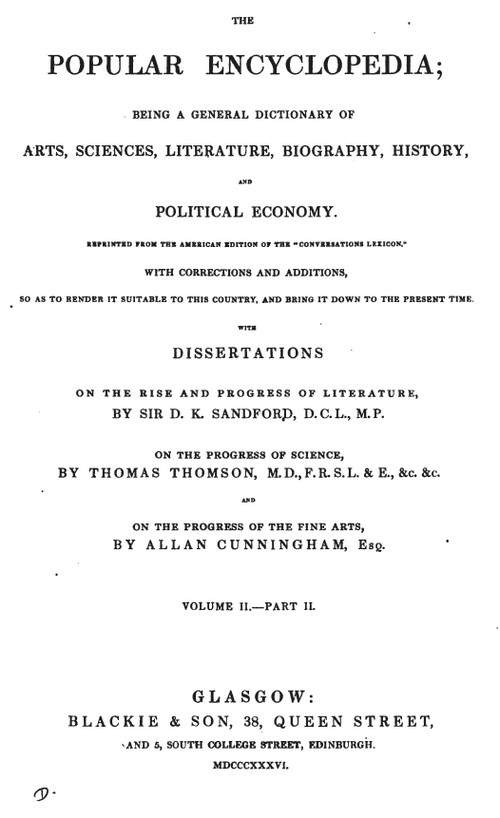
CONSTANCE; capital of the Seekreis (Circle of the Lake), in the grand-duchy of Baden, on the lake of Constance, or Boden, where the Rhine unites the upper part of the lake with the lower; lat. 47° 36′ 10* N., and long. 9° 8′ E. The city and its two suburbs, connected by a bridge over the Rhine, are partially fortified, and very extensive, considering the small number of inhabitants (4500). The ancient episcopal residence and the catedral contain beautiful monuments of Gothic architecture. Constance is memorable for the Council of 1414—18. The German emperor, the pope, 26 princes, 140 counts, more than 20 cardinals, 7 patriarchs, 20 archbishops, 91 bishops, 600 other clerical dignitaries and doctors, and about 4000 priests, were present at this ecclesiastical assembly, which was occasioned by the divisions and contests about the afiairs of the church. From 1305—77, the popes had resided at Avignon; but, in 1378, Gregory XI removed the papal seat back to Rome. After his death, the French and Italian cardinals could not agree upon a successor, and so each party chose its own candidate. This led to a schism which lasted 40 years. Indeed, when the emperor Sigismund ascended the throne, in 1411 there were three popes, each of whom had anathematised the two others. (See Antipope). To put an end to these disorders, and to stop the diffusion of the doctrines of Huss, Sigismund went in person to Italy, France, Spain, and England, and (as the emperor Maximilian I used to say in jest, performing the part of the beadle of the Roman empire) summoned a general Council. The pretended heresies of Wicklifte and Huss were here condemned, and the latter, notwithstanding the assurances of safety given him by the emperor, was burnt, July 6, 1415 ; and his friend and companion, Jerome of Prague, met the same cruel fiate, May 30, 1416. After the ecelesiastieal dignitaries supposed they had sufficiently checked the progress of heresy by these executions, they proceeded to depose the three popes-John XXII (also called XXIII.), Gregory XII and Benedict XIII. John, who was present at the Council, was forced to consent to his own removal. He escaped, indeed, with the aid of Frederic, duke of Austria, who was excommunicated and put under the ban of the empire for rendering him assistance, and also lost a large part of his territory. But Frederic at last yielded, delivered John up to the Council, and allowed him to be imprisoned. The former pope now gladly received the humbler office of a cardinal. Gregory XII experienced a similar loss of dignity. Benedict XIII, in Spain, retained, for some time, the name of pope, but was little noticed. Martin V, on the contrary, was legally chosen to the chair of St Peter. Sigismund now thought a complete reformation might be effected in the affairs of the church; but, the new pope having retired to Italy against the emperor’s will, the assemoly was dissolved, and his object was not attained. It was first accompliahed at the Council of Basil (q. v.). Travellers are still shown the hall where the Council assembled (now occupied as a market house); the chairs on which sat the emperor and the pope; the house where Huss was apprehended, and where his bust is still to be seen; his dungeon, in the Dominican monastery; his statue which serves as a support to the cathedral; and, in the nave of the church, a brasen plate on the spot where the venerable martyr listened to his sentence of death; also the place, in a garden, where he was burnt. After the Council had been convinced of the heresy of Huss, the bishop of Concordia read, in the cathedral, the sentence, that his books should first be burnt, and that he as a public and scandalous herede, and an evil and obstinate man, should be disgracefully deprived of his priestly dignity, degraded, and excommunicated. The sentence was immediately executed, and began with the degradation. The bishop of Milan and six other bishops led Huss to a table where lay the garments used in the mass, and the other raiment of the priests: they clothed him with them, and, when he was in full dress, with the cup in his hand, the bishops once more called upon him to save his life and honour, and to abjure his opinions. Huss refused, and spoke to the people from the scaffold. After he had spoken, the bishops cried out to him, “Descend from the scaffold” The bishop of Milan and another bishop now took the cup, saying, “O Huss, we take from titee the cup in which was offered the blood of Christ; thou are not worthy of him.” The other bishops then came forward, and each one took off some pert of the priestly apparel with the same speech. When they had finished with the clothes they scraped his shaven crown (to designate the removal of the oil of consecration). Finally, when the excommunication was eaded, they placed upon his head a paper crown, nearly a yard high, with devils pain ted upon it, and the inscription, “John Huss, arch-heretic.” The bishops now turned to the emperor, and said, “The holy Council of Constance now surrenders to the temporal power and tribunal John Huss, who has no longer office or dignity in the church of God.” The emperor arose, and took Huss, and said to the palatine Louis, “As we, dear cousin and prince, wear the temporal sword, take this John Huss and have him punished as becomes a heretic.” Louis laid down his princely ornamento, and led Huss to the provost of Constance, to whom he said, “Upon the sentence of our gracious lord, the Roman emperor, and our special order, take this master Huss, and burn him as a heretic.” The governor gave him to the executioner and his attendants, and Huss was burnt.
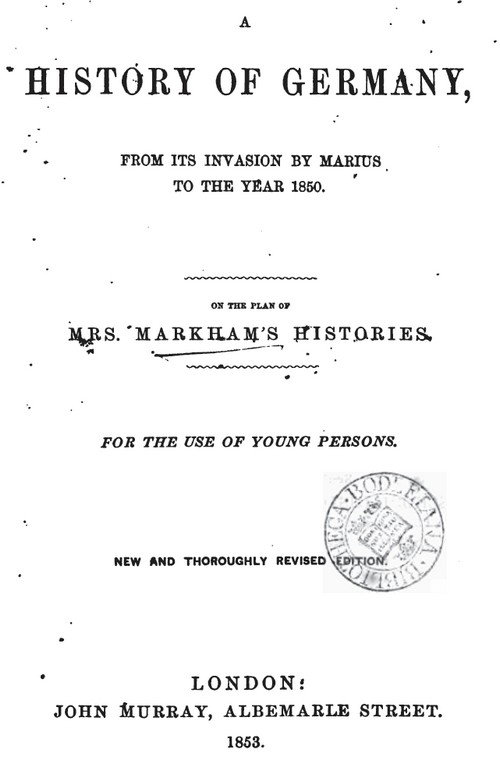
CHAPTER XXX
SIGISMUND – THE MARTYRDOM OF JOHN HUSS AND JEROME OF PRAGUE A.D. 1414 and 1415
The Council of Constance commenced its session on the 28th November, 1414. It had been decided that this assembly should consist of bishops, doctors of the universities, and temporal princes or their ambassadors; the secular power being represented by the emperor, all the electors, and a crowd of nobles, who appeared as the plenipotentiaries of foreign sovereigns. The spiritual representatives were 3 patriarchs, 33 cardinals, 47 archbishops, 145 bishops, 124 abbots, 1800 priests, 750 doctors, and many monks. Of the three rival popes John XXIII alone came in person. In one of the rugged passes of the Alps his carnage was overturned in a snow-drift; and the peasants of the neighbourhood who ran to offer him assistance and receive his blessing, were astounded at hearing the Holy Father curse and swear at his attendants in a style of which a trooper would have been ashamed. Independently of those immediately engaged in the Council, the number of persons whom curiosity or the love of gain attracted to Constance is reported to have been at least 150 000, among whom were mountebanks, buffoons, and women of bad character in shoals. There were also actors brought from England who represented mysteries, or scenes from Scripture history, an exhibition which seems to have given the Germans the first taste for dramatic performances. The nations whose representatives appeared at Constance are thus described by a contemporary writer: “The Germans are enduring as well as impetuous, the French boastful and arrogant, the English prompt and sagacious, the Italians subtle and intriguing.” The northern party (that is to say the Germans, French, and English) with the Emperor at their head, and supported by the talent of the French Cardinal d’Ailly, and of Gerson, the celebrated chancellor of the university of Paris, having carried a resolution that the votes should be taken according to nations (an arrangement which deprived the Italian cardinals and bishops of the weight which their suffrages would have possessed if the spiritual and temporal deputies had voted in separate bodies), now went a step farther, and declared that the Council was superior to the popes, who were all called on to resign their usurped dignities. Gregory XII submitted to this decree of the Council, and became a simple cardinal. John, who after laying down his insignia had attempted to recover his rights by force, was condemned to imprisonment in the Castle of Heidelberg, where he remained until the year 1418. The third pope, Benedict XIII, who was in Spain, continued to bid defiance to their proclamations. Having thus humbled the popes, the Council of Constance proceeded to take cognizance of those heresies which had lately disturbed the peace of the church. The University of Prague had been celebrated ever since its establishment in 1348 for the learning and talent of its professors. Among these was John Huss, who had read the writings of Wiclif, which the marriage of Anne, the sister of Wenceslaus with Richard II of England, had been the means of introducing into Bohemia. As early as the year 1401, Huss had maintained that the Pope was no greater than any other bishop, that useless holidays ought to be abolished, that the doctrine of purgatory had no foundation in Scripture, that confirmation and extreme unction were not sacraments, that auricular confession was a vain thing, that altars, priestly vestments, images and consecrated vessels were useless, and that prayer needed not be offered up in churches, for the whole earth being the Lord’s any spot of it might be used as his temple. He also contended that the sacrament of the Lord’s supper ought to be received in both kinds by the laity, and that the bread and wine in the Eucharist were not transubstantiated into the body and blood of Christ, but that the real body and blood were received after a spiritual and mysterious fashion. In the dissemination of these doctrines he was assisted by his friend and pupil Jerome Faulfisch, commonly called Jerome of Prague; and, in spite of opposition, these two courageous men continued to lecture and preach at Prague and elsewhere, until they were summoned to appear before the Council at Constance and give an account of their doctrine, a safe-conduct from the Emperor being at the same time promised to them. Immediately after the assembling of the Council, the Bishops of Augsburg and Trent and the burgomaster of Constance were sent to require the attendance of Huss, who had already been some days in the city. As he entered the council-hall and respectfully saluted the company, one of the cardinals said, “Master Huss, we have manifold complaints against you, that you nave taught and propagated gross, palpable, fearful errors against the orthodox church, for which cause we have summoned you before us that we may hear from your own mouth how the matter standeth.” To this address Huss replied, “Reverend Father, rather would I die than avow myself guilty of one, much less of so many acts of heresy; wherefore I appear before you this day with the determination, whatever errors can be proved against me, to retract and abjure the same.” Huss was then removed into an ante-chamber, and the Council adjourned, but assembled again in the afternoon, and before night decided on arresting him: this resolution was announced to Huss by his enemy Philip Palitz, in the following words: “We have thee now, and verily I say unto thee, thou hast not come out thence until thou hast paid the uttermost farthing.” He was then thrown into a narrow and filthy dungeon, the pestilential air of which soon brought on a raging fever. In spite of repeated petitions he could not obtain a hearing until the 7th June, 1415, and even then was so often interrupted by the outcries of the assembly, that at last he said, “I had hoped that you would have heard me; but inasmuch as this clamour is raised to drown my voice, it remaineth only for me to be silent.” The articles of accusation were then read; some of them were absurd enough, and even Huss himself could not forbear smiling at the charge brought against him of maintaining the existence of four Gods, but he was not allowed to reply to this or any other of the articles. This mock enquiry lasted until the 6th of July, when Huss was condemned to the names, the Emperor Sigismund pronouncing sentence in these words: “If John Huss will not abjure his heresies, we condemn him to be burnt; if he will abjure them, he shall nevertheless be forbidden again to preach or return to Bohemia. His followers, and especially Jerome, shall also be severely punished.” Against this sentence the friends of Huss vehemently protested as inconsistent with the safe-conduct which the accused had received from the hands of the Emperor himself; but Sigismund coldly replied that such a safe-conduct could have no reference to a heretic, since neither the laws of God nor of man required that faith should be kept with one who obstinately opposed himself to the true belief. Day was just beginning to dawn on the morning of the 6th of July, when the Bishop of Riga, attended by four men-at-arms, entered the prison and commanded Huss to follow him to the cathedral, where he was detained a long time at the door, lest his presence should desecrate the mass which they were performing within. The church had been prepared for the occasion; on a magnificent throne sat the Emperor with the imperial sceptre in his hand and the crown on his head, surrounded by princes of the empire, cardinals, and bishops. In the midst of tins assembly, on a high table, lay a surplice and other robes, which were to be employed in the ceremony of degrading Huss from the priesthood. The business of the day was opened by a bishop, who preached a long sermon from Romans vi. 1: “What shall we say then? Shall we continue in sin that grace may abound?” Another bishop then mounted the steps of the reading-desk and read front a paper the articles of accusation; but whenever Huss attempted to speak, he was silenced by cries of “Peace, heretic!” When however in conclusion he was charged with having treated the ban of the Pope with contempt, he raised his voice, exclaiming, “That is false; I publicly appealed to a higher tribunal, and carne before this Council to defend myself, trusting to the Emperor’s promise that no evil should befal me :”here he fixed his eyes sternly on Sigismund, whose face was instantly covered with the blush of conscious guilt. The papal commissary, an old bald-headed man, then read the sentence by which John Huss was condemned to the flames; and the martyr, kneeling down, prayed that God would forgive his murderers. Seven bishops, who were to perform the ceremony of degradation, next advanced, and put the robes on him, as if he were about to celebrate mass, placing at the same time the chalice in his hands. The first act of degradation was the taking from him the chalice with these words, “Thou accursed Judas! we take from thee this cup, wherein the blood of Christ is offered up for the forgiveness of sins, because thou hast abandoned the counsel of peace.” To which Huss meekly replied, “I trust that today I shall drink of this cup in the kingdom of God.” Then they took from him the priestly vestments one by one, pronouncing a curse as each portion was removed. When they were about to destroy his tonsure, a difference of opinion arose among the bishops, whether it should be done with a razor or scissors.— “See,” said Huss, “they cannot even settle how I am to be mocked.” These ceremonies being completed, the bishops recommended his soul to the devil; to which Huss rejoined — “And I commend it to my Lord Jesus Christ.” He was then delivered over to the secular authorities, who placed on his head a paper cap, half an ell in height, ornamented in front with a representation of three devils, and the inscription— “This is an arch heretic.” On arriving at the place of execution, where a stake had been already fixed in the ground, Huss fell on his knees, and lifting up his eyes to heaven, recited the 30th and 50th Psalms, often repeating the words, “Into thy hand I commend my spirit, for thou hast redeemed me, O Lord, thou God of truth.” Many of the spectators who heard this exclaimed, “What this man’s former doctrine may have been we know not, but surely these which we hear are holy words. “Others said, “Why is not a confessor allowed him?” This last question was addressed move immediately to a priest who sat close to the stake, feasting his eyes on the preparations for execution. Starting as if from a dream, the churchman stared angrily at the crowd, and raising his voice to a pitch which made him distinctly audible even to those who stood farthest from the prisoner, shouted out, “Listen not to the heretic, there is no need to send him a confessor.” “The paper cap having fallen from Huss’s head during his prayer, this man replaced it, saying, “Let the devils and the devil’s servant burn together.” The executioner then bound him with an old rusty chain and several cords: but the faggots had yet to be brought: and Huss stood chained to the stake whilst the attendants piled them around him. All being at length ready, and the executioner about to apply his torch to the pile, the Duke of Bavaria rode up and promised the prisoner that his life should be spared, if he would recant his errors. To this Huss replied in a loud voice, “I call God to witness that I have never either taught or written those things with which false men have charged me; but in all my teaching I have sought only how best I might turn the people from their sins, and lead them to the kingdom of God. The truth which I have taught I am now ready to seal with my blood.” The executioner then set fire to the pile, which was instantly enveloped in flames: and the martyr, standing in the midst, was distinctly heard to say, “O Christ, thou Son of God, have mercy upon me.” This he repeated twice, but at the third attempt the flames caught his face, and only the words “Christ—Son of God” were distinguishable. His lips continued in movement a few seconds longer, and then he bowed his head and died. As the fire declined, the executioner and his men raked out his heart, which was still entire, from the midst of the ashes, and fixing it on a stake, held it in the flame until it was consumed. That nothing might remain to be used as a relic by his disciples in Bohemia, the Duke of Bavaria ordered his cloak, girdle, and other garments to be burnt, and the ashes of the whole pile, and even the soil on which it stood, to be scraped together and thrown into the Rhine. The putrid carcass of a mule was also buried on the spot, and the vulgar taught to believe that the soul of the arch heretic had parted from the body in a cloud of sulphur, leaving this unsavoury odour behind it. Thus died John Huss on his forty-second birthday. His disciple, Jerome of Prague, had fled from Constance as soon as he found that there was no hope of saving his friend; but was soon arrested and thrown into prison, where the pangs of hunger and sickness so wrought upon his spirit that he recanted. When brought before the council, however, his courage returned, and he boldly declared that he would not retract a tittle of what he had taught. So heroic was his bearing, that Cardinal Poggio called him a second Cato. “I will not abjure my belief,” continued Jerome, “for my sainted master hath with reason and justice written against your false doctrines, your shameless lives and evil practices. Slay me, if ye list, but in this belief will I live and die. “When the executioner was proceeding to light the faggots behind him, he called out, “Light them before my face: for if I had been afraid of fire, I had not stood here this day.” Having thus settled the question of heresy, the Council proceeded to the election of a Pope, and chose an Italian cardinal, Martin V, who soon succeeded in replacing the veil of thick darkness which had been in some mea-sure withdrawn from the abuses of the church.
CHAPTER XXXI
SIGISMUND —THE HUSSITE WAR
From A.D. 1418 to 1438
When the ashes of John Huss were thrown into the Rhine, the rulers of the church believed that his name had perished with his body. But the people thought far otherwise. In Bohemia the spirit of his teaching had spread far and wide, and would probably have extended into Germany, had not its progress been checked by the estrangement between the two nations, which the unhappy partiality of Wenceslaus had produced some years before, and by the inability of Huss to preach in the German language. The states of Bohemia, having protested in strong terms against the monstrous acts of the council, proceeded to pass a law, authorizing all landed proprietore to permit the preaching of Huss’s doctrines on their estates. Many availed themselves of this permission, and gave public encouragement to the followers of the Martyr, who were now called Hussites and “brethren of the chalice,” because their master had taught that the laity ought to receive the communion in both kinds. Pope Martin, immediately after the breaking up of the council, had issued a bull of excommunication against all who should adhere to the heretical doctrines of John Huss. This proceeding, which was intended to silence effectually those who were discontented with the abuses in the church, had a directly contrary effect. Scarcely had the bull reached Prague, when crowds of men were seen parading the streets in gloomy silence, or collected in groups discussing, in low murmurs, some subject of deep interest, whilst their fierce countenances and menacing gestures showed that they contemplated deeds of violence. They had not long to wait for an opportunity. At the court of Wenceslaus there lived a tried warrior, named John Ziska, who had fought with distinction in Poland, and was now chief favourite of the king. To this knight the priesthood were particularly hateful, because one of them had seduced and abandoned his favourite sister. As a true Bohemian, too, he detested the Germans. Since the execution of Huss, the man’s demeanour had undergone a total change: his frank, blunt manner had given place to moody silence; or he would wander for hours about the palace with eyes fixed on the ground, muttering from time to time words which were but imperfectly understood by those who heard them. At length Wenceslaus himself enquired the cause. “They have burnt Huss,” he replied, in a hollow tone, “and we have not yet avenged him.” “I cannot help it,” said the King; “you must try yourselves what you can do.” These words, which were spoken jestingly, Ziska pretended to understand in sober earnest, and immediately called the Hussites to arms. This was going further than Wenceslaus had intended; and, terrified at the prospect of an insurrection, he ordered the citizens to bring all their weapons into the castle of Wisherad, where he was then residing. The injunction was literally obeyed, except that, instead of bringing their weapons in piles for the purpose of depositing them in the castle, the burghers appeared, armed to the teeth, and marching in military order, headed by Ziska, who thus addressed the king:—”Here we are, most illustrious and gracious sovereign, waiting to know against what enemy it is your royal will that we should march.” The whole city was now in confusion. The Hussites, hearing a chalice as their standard, marched in procession through the streets. As they passed the town-hall, a stone was thrown at them: enraged at this affront, they burst into the council-chamber, and threw thirteen German counsellors out at the Windows. Ziska at the same time gave Orders for storming the house of a priest (probably the seducer of his sister), and hanging him up at his own door. Amidst these horrors the unfortunate King sat listening to the roar of the enraged multitude; and when it seemed to approach the castle, was seized with a fit of apoplexy, which put an end to his life on the 16th of August, 1418. His death removed the only restraint on the fury of the mob. They burst into convents and churches, dashed the images in pieces, and tore the clerical vestments into shreds, of which they made flags. Meanwhile a priest, named Matthias Toczenicza, had erected in the middle of one of the streets a sort of rude altar or table, and employed himself the whole of the day in administering the communion in both kinds to all who chose to receive it. But the more substantial burgesses of Prague soon recollected how much they had to lose, and how little prospect there was of any advantage adequate to the danger incurred. They therefore treated with the widow of Wenceslaus, Queen Sophia, who still held out in the castle of Wisherad, and sent a deputation to the Emperor to propose an accommodation: but Sigismund dismissed the envoys with insult, and swore a bloody revenge. Ziska, meanwhile, far from countenancing these pacific measures, had led out the more determined men of his party into the country, in order to raise the peasantry. He called on all who could only throw a stone or wield a staff, to unite and arm themselves against the enemies of God. This appeal was answered by the assembling of an immense crowd at Whitsuntide, 1419. They called themselves God’s people, named the hill on which they assembled Mount Tabor, and pledged themselves to exterminate the Moabites and Amalekites; for by this name they designated the adherents of the Pope. Ziska was chosen their leader, and thenceforth assumed the title of “John Ziska of the chalice, Commander in the hope of God of the Taborites.” At the head of an irregular rabble of men, women, and children, he marched through the land, plundering and burning churches and monasteries, and committing the most wanton aggressions. Among other acts of cruelty, he is said to have confined several priests in pitched barrels, and setting them on fire, to have exclaimed, as the unfortunate wretches screamed in the agonies of death, “Hark to my sister’s bridal song!” The widow of Wenceslaus despatched a force to destroy the insurgent army before their numbers should increase; but Ziska ordered the women who followed his camp to take off their petticoats and veils, and throw them on the ground, by which manoeuvre the feet of the horses became so entangled, that the insurgents gained an easy victory. In the month of June, 1420, the Emperor entered Prague, threw twenty-four Hussites into the river, and being reinforced by an army under Frederick of Austria, attacked with 100,000 men a high bill near the city, on which Ziska had entrenched himself. Here the passage of the army was for a long time disputed by three heroic Bohemian maidens, who refused to give way until they were borne down by numbers. After a long and fierce engagement the Germans were compelled to retire, leaving the enemy in possession of their camp. This success of the Taborites drew crowds to their standard. In all parts of the country, the peasants, armed with flails, which they wielded with terrible force and effect, were formed into companies, and constructed a temporary barricade wherever they halted, by chaining their waggons together. A fresh rabble also appeared in a mountain near Ledecz, which they named Mount Horeb, and themselves Horebites. In Moravia a sect arose, who professed to emulate the simplicity of Paradise, walking about stark naked, and committing such gross acts of folly as contributed not a little to bring the Hussite doctrines into contempt. In the year 1421 Ziska made a progress through the country, burning all the convents, and putting to death hundreds of these fanatics, who were known by the title of Adamites. The discipline of his army was cruelly severe. It was forbidden to quit the ranks, on pain of death, to plunder or bum without orders, or to appropriate even the smallest portion of booty before the general distribution. The same punishment was inflicted on liars, gamblers, and unchaste persona. Ziska, who had many years before lost an eye in the Polish wars, was this year reduced to total blindness by an accident which befell him as he was besieging the town of Raby. He had climbed a tree, the better to observe the enemy’s operations, when a cannon-ball struck the branches, and forced some of the splinters into his remaining eye. Yet he still commanded his army with as mach courage and vigour as before, travelling in a carnage, which was always stationed near the great standard. His progress was like that of the destroying angel; wherever he marched his course might be tracked by heaps of dead bodies and the light of blazing towns; for if admittance into any place was refused him he slew and burnt without mercy. The man’s constitution seems, like his heart, to have been of iron. Night and day he compelled his troops to march without taking any rest, until, wearied out and fainting with fatigue, they complained that darkness and light might be the same to him, as he was blind, but that it was not so with them. “What !” exclaimed he in affected surprise, “cannot you see ? Light up a couple of villages, then.” Meanwhile the moderate party in Prague, and the nobles of the country, scandalized and terrified at these disorders, and anxiously longing for peace, assembled a diet and agreed on the following articles:
1. Freedom of preaching;
2. The communion in both kinds;
3. Poverty of the priests, and appropriation of all ecclesiastical property;
4. The extirpation of all sins, namely, those of a moral kind, as well as those more directly punishable by law.
This last article seems to have been added for the sake of conciliating the Taborites. It was also proposed by the moderate party to offer the crown to Coribut, son of the Duke of Lithuania; but the wild Horebites and Taborites, who had been accustomed to live in their waggon fortresses in a sort of republican equality, had no inclination to become the subjects of a king, or allow the interference of nobles in their affairs. Finding how hopeless their cause was, the nobles abandoned the insurgents, and repaired to Iglau, where the emperor was then residing; whilst the burghers of Prague, seeing no prospect of assistance from any other quarter, were constrained to open their gates to Ziska, who entered the city in solemn procession, the host being borne before him in a golden pyx, and the whole population of Prague falling on their knees as it passed. In January, 1422, the emperor put his army in motion against Ziska, who marched out of Prague to meet him. Both parties acted with the greatest circumspection; but the Hussite army was at length surrounded by a skilful manoeuvre of the imperialists. With desperate courage the Hussites cut their way by night through the enemy, a great number of whom were drowned in attempting to cross the river Sazewa, which was imperfectly frozen. Ziska attacked the survivors, overthrew them with great slaughter, and under the shadow of the imperial banners, which he had captured, conferred knighthood on the bravest of the Taborites. The emperor now endeavoured to gain over Ziska by presents and flattering messages; but the veteran leader remained inflexible, and soon afterwards died of the plague, in the month of October, 1424. On his’ death-bed he commanded that his body should be flayed after his decease, and a drum covered with the skin, that his followers might still hear as it were the voice of Ziska whenever they went forth to battle. The appearance of this extraordinary man was as remarkable as his actions. A bald bullet head, seamed with a deep crooked furrow across the brow, surmounted a pair of shoulders of preposterous breadth as compared with the shortness of his legs and body; whilst an expression of fierceness was given to the face by a nose like the beak of an eagle, and a fiery red moustache on the upper lip. Many years after his death, when the Emperor Ferdinand I visited his burial-place at Cyazlow, and saw the massive iron mace which was Ziska’s favourite weapon, he is said to have recoiled in horror, exclaiming, “How terrible must this man have been in life, when even after death the sight of his arms can inspire such dread !” After Ziska’s death the majority of the Horebites chose Procopius Holy for their leader, whilst the minority, styling themselves “Ziska’s orphans,” vowed never again to submit to the rule of mortal man, or sleep under a roof. Pope Martin V published a Crusade against them, and sent Henry Beaufort, Cardinal of Winchester, to rouse the Germans. But in the year 1431 the imperial army was totally and disgracefully defeated by the Hussites, all their artillery and baggage falling into the hands of the enemy. Sigismund now offered them the right hand of fellowship, but his proposals being received coldly, he left the prosecution of the affair to the Council which had lately assembled at Basle. To this Council the Bohemians were invited, and on the 9th July, 1433, three hundred of them entered the city on horseback, where they were received with all honour, and the four articles of Prague conceded to them under certain modifications: the Bohemians consenting to receive Sigismund as their king, and he on his part engaging to procure the sanction of the Pope to the establishment of their national religion in Bohemia. Still the Taborites and “Orphans” were discontented, but were finally overthrown in a tremendous battle near Prague on the 20th May, 1434. In the year 1438 the emperor died, and with him ended the Luxembourg dynasty.
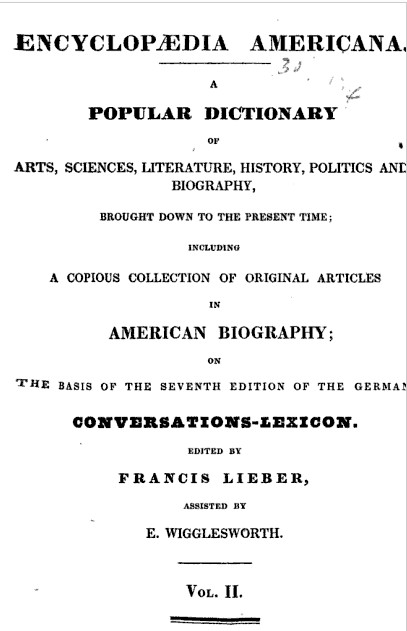
Bohemian Brethren; the name of a Christian sect, which arose in Bohemia, about the middle of the 15th century, from the remains of the stricter sort of Hussites. Dissatisfied with the advances towards popery, by which the Calixtines had made themselves the ruling party in Bohemia, they refused to receive the compacts, as they were called, i. e., the articles of agreement between that party and the council at Basil (30th Nov. 1433), and began, about 1457, under the direction of a clergyman, Michael Bradatz, to form themselves into separate parishes, to hold meetings of their own, and to distinguish themselves from the rest of the Hussites by the name of Brothers, or Brothers’ Union; but they were often confounded by their opponents with the Waldenses and Picards, and, on account of their seclusion, were called Cavern-hunters (Grübenheimer). Amidst the hardships and oppressions which they suffered from the Calixtines and Catholics, without making any resistance, their numbers increased so much, through their constancy in their belief and the purity of their morals, that, in 1500, their parishes amounted to 200, most of which had chapels belonging to them. The peculiarities of their religious belief arc seen in their confessions of faith, especially their opinions with regard to the Lord’s supper. They rejected the idea of transubstantiation, and admitted only a mystical spiritual presence of Christ in the Eucharist. In other points, they took the Scriptures as the ground of their doctrines throughout, and for this, but more especially for the constitution and discipline of their churches, received the approbation of the reformers of the 16th century. This constitution of theirs was framed according to the accounts which remain of the oldest apostolic churches. They aimed to restore the primitive purity of Christianity, by the exclusion of the vicious from their communion, and by making three degrees of excommunication, as well as by the careful separation of the sexes, and the distribution of the members of their society into three classes—the beginners, the proficients and the perfect. Their strict system of superintendence, extending even to the minute details of domestic life, did much towards promoting this object. To carry on their system, they had a multitude of officers, of different degrees: viz. ordaining bishops, seniors and conseniors, presbyters or preachers, deacons, aediles and acolytes, among whom the management of the ecclesiastical, moral and civil affairs of the community was judiciously distributed. Their first bishop received his ordination from a Waldensian bishop, though their churches held no communion with the Waldenses in Bohemia. They were destined, however, to experience a like fate with that oppressed sect. When, in conformity to their principle not to perform military service, they refused to take up arms in the Smalkaldic war against the Protestants, Ferdinand took their churches from them, and, in 1548, 1000 of their society retired into Poland and Prussia, where they at first settled in Marienwerder. The agreement which they concluded at Sendomir (Sandomierz), 14th April, 1570, with the Polish Lutherans and Calvinistic churches, and still more the Dissenters’ Peace Act of the Polish convention, 1572, obtained toleration for them in Poland, where they united more closely with the Calvinism under the persecutions of the Swedish Sigismund, and have continued in this connection to the present day. Their brethren, who remained in Moravia and Bohemia, recovered a certain degree of liberty under Maximilian II, and had their chief residence at Fulnek, in Moravia, and hence have been called Moravian Brethren. The issue of the 30 years’ war, which terminated so unfortunately for the Protestants, occasioned the entire destruction of their churches, and their last bishop, Comenius, who had rendered important services in the education of youth, was compelled to fly. From this time, they made frequent emigrations, the most important of which took place in 1722, and occasioned the establishment of the new churches of the Brethren by count Zinzendorf. Although the old Bohemian Brethren must be regarded as now extinct, this society will ever deserve remembrance, as a quiet guardian of Christian truth and piety, in times just emerging from the barbarity of the middle ages; as a promoter of pure morals, such as the reformers of the 16th century were unable to establish in their churches; and as the parent of the esteemed and widely extended association of the United Brethren, whose constitution has been modelled after theirs.
